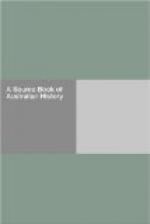The members of the anti-emancipist party in New South Wales attribute the increase of crime in that colony partly to alleged relaxation of convict discipline under Sir Richard Bourke; partly to the action of the Jury Laws, which permit persons who have been convicts to become jurors; and lastly, to the increasing number of emancipists.
The first-mentioned cause of the increase of crime in New South Wales refers to the Quarter Session Act, passed in 1833; by that Act, the summary jurisdiction of single magistrates over convicts, was somewhat diminished, and a magistrate was prevented from inflicting more than 50 lashes for a single offence, instead of 150 which he might have given before at three separate inflictions. These complaints do not seem to your Committee to have the slightest foundation in fact, and Sir Richard Bourke appears to have acted with wisdom, justice, and humanity in his treatment of the convict population.
With regard to the second alleged cause of the increase of crime, namely, the jury laws, your Committee need hardly repeat, that the well-proven effect of transportation is to demoralize, not to reform an offender; therefore, in a community like New South Wales, wherein so large a proportion of the population are persons who have been convicts, to permit such persons generally to sit upon juries must evidently have an injurious effect. Your Committee, however, must observe, that under a good system of punishment, an offender should, at the expiration of his sentence, be considered to have atoned for his crimes, and he should be permitted to commence a new career without any reference to his past one.
With regard to the last alleged cause of the increase of crime, namely, the increasing number of emancipists; little doubt, your Committee think, can be entertained of the pernicious consequences of annually turning loose a number of unreclaimed offenders on so small a community as that of New South Wales.
One of the supposed advantages of transportation is, that it prevents this country from being burthened with criminal offenders, after the expiration of their sentences. It is now, however, evident that transportation does not tend to diminish the sum total of offences committed in the British Dominions; it may, perhaps, relieve Great Britain and Ireland from a portion of their burthen of crime; though, from the little apprehension which transportation produces, that fact may be reasonably doubted. On the other hand, it only transfers and aggravates the burthen upon portions of the British Dominions, which, like New South Wales, and Van Diemen’s Land, are least able to bear it.
In 1836, the free population of New South Wales amounted to 49,255, of whom about 17,000 had been convicts. In 1834, the free population of Van Diemen’s Land did not exceed 23,315, of whom about 3,000 were expirees.




